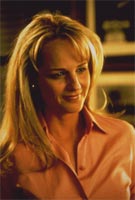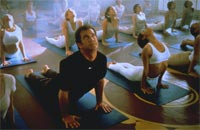
What Women Want
©Icon Entertainment International / Paramount Pictures /
Centropolis Effects / Wind Dancer Productions /
RCV Film Distribution BV, Netherlands

|
A sudden jolt in the bathtub unexpectedly shoots Nick Marshall (Mel Gibson) into a world
where he can hear what women think and how women react, which sends him on a
pathway hoping to discover what women want. As an executive working for an advertising
agency, this concept translates itself, in his mind, into what makes them think they want
things that they can ultimately purchase. The new rise in consumer power among women
demands a switch from his usual selling angles of beer, bikinis, and babes to a new, as yet
undiscovered, approach. His objectives are not noble, motivated as they become by
recently losing an upgrade to creative director for the company, but he still has hopes to
manipulate his way into a top level spot by reading the mind's of everyone he can use to
assist him.
It is incredible that so much acting talent has been propped together in a pretentious film
with limited scope. What is perhaps more incredible is that the screenplay (by Josh
Goldsmith and Cathy Yuspa from an original story by Diane Drake) pretends to explore the
aptitude of men to define objectivity toward women by developing an awareness of their
sensitive "feminine" side. The unfulfilled premise is that they can, in a rewarding manner,
become capable of developing fulfilling and meaningful relationships with the opposite sex
and, in doing this, realize their full potential as men. By the end of the film all that remains
of this noble goal is romantic froth. In order to achieve the film's intention the viewer would
have to lose sight of the fact that all the women surrounding the central character react to
him according to their own socially acceptable systems of role-playing as previously
established in the male-dominated business world.
What Women Want
©Paramount Pictures
Photo courtesy RCV Film Distribution

|
This world is a man's world, most obviously displayed by the attitude of the company's top
director (Alan Alda) whose every move is to "save his ass" even if he preaches the value
of women (meaning consumers) in today's world. The women operating within the
company go about their daily routine while keeping private thoughts to themselves, that is
until their thoughts can be heard. Considering that they are all trapped in a specific
behavioral pattern to survive within this male-orientated structure, one can comprehend
that it is not solely the fault of the central character that he has remained so insensitive
and unaware. His unreceptiveness is only openly commented upon (and without much
effect) by his daughter, Alex (Ashley Johnson). Is it any wonder that he has carried on
merrily for years in his fashion? Many of the women also appear to be helplessly
overcome, quite honestly, by his good looks and position. (After all, it is Mel Gibson.)
Feminism takes a back seat until a new force in the advertising team arrives in the form of
recently appointed boss, Darcy McGuire (Helen Hunt), and even her knees tremble at the
sight of her male contender. (Although he's dressed, she can't even control a reflex to
clock his private parts.) All seems to be acceptable in the masqueraded world of a sex-
comedy where the issue is not really sexual equality, liberation, and understanding, but
rather finding a funny method for boy to get girl with the girl as the hero of the piece. You
don't have to be a mind reader to figure out where things are going to wind up.
Perhaps, in closing, it's best to use the words of Mel Gibson reflecting on an often used
quote of director Nancy Meyers, 'Dying is easy, comedy is hard'. And if you're not funny,
believe me, you die up there." He may rate this film alongside the work of Lubitsch, Capra
and Wilder, but, quite honestly, it just doesn't have the Lubitsch touch.
Bette Midler, with her short and powerful cameo, manages to steal the show as the quick-
witted shrink with a proposition that the ad man can't refuse.
© 1994-2006 The Green Hartnett
|

